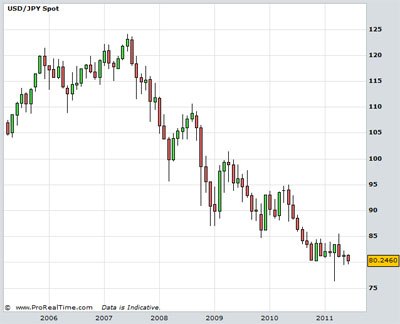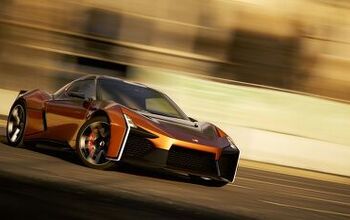Japanese Automakers And Unions To Government: Lower Then Yen, Or We Are Out Of Here

In an (especially for Japanese tastes) strongly worded joint statement, Toshiyuki Shiga. Chairman of Japan Automobile Manufacturers Association, and Koichiro Nishihara, President of the Confederation of Japan Automobile Workers’ Unions threw down the gauntlet to the Japanese government. Executive summary: “We are sick as hell of the high yen and we can’t take it anymore. Do something, or kiss those jobs sayonara.”
Current foreign exchange rate levels represent, for the yen, an appreciation that not only far surpasses all prior projections by Japanese automakers, but also totally fails to reflect Japan’s economic fundamentals.
Having been heavily affected by the devastating March 11 earthquake and tsunami, automobile production in Japan is at last moving towards recovery. The yen’s excessive appreciation risks gravely hampering this nascent recovery and, in doing so, imperiling the resurgence of Japan’s weakened economy.
In view of these realities, JAMA and the CJAWU strongly demand that the Japanese government take swift and effective action aimed at reducing the yen’s current strength.
In other countries, talk like this would be shrugged-off as posturing. A joint statement by employers and unions would raise eyebrows anywhere. In highly polite Japan, such a statement is the last step before a suicide note. Shiga is also the COO of Nissan, a company far less exposed to the high yen than Toyota or Honda. One dollar buys 80 yen today.

Bertel Schmitt comes back to journalism after taking a 35 year break in advertising and marketing. He ran and owned advertising agencies in Duesseldorf, Germany, and New York City. Volkswagen A.G. was Bertel's most important corporate account. Schmitt's advertising and marketing career touched many corners of the industry with a special focus on automotive products and services. Since 2004, he lives in Japan and China with his wife <a href="http://www.tomokoandbertel.com"> Tomoko </a>. Bertel Schmitt is a founding board member of the <a href="http://www.offshoresuperseries.com"> Offshore Super Series </a>, an American offshore powerboat racing organization. He is co-owner of the racing team Typhoon.
More by Bertel Schmitt
Latest Car Reviews
Read moreLatest Product Reviews
Read moreRecent Comments
- Philip I love seeing these stories regarding concepts that I have vague memories of from collector magazines, books, etc (usually by the esteemed Richard Langworth who I credit for most of my car history knowledge!!!). On a tangent here, I remember reading Lee Iacocca's autobiography in the late 1980s, and being impressed, though on a second reading, my older and self realized why Henry Ford II must have found him irritating. He took credit for and boasted about everything successful being his alone, and sidestepped anything that was unsuccessful. Although a very interesting about some of the history of the US car industry from the 1950s through the 1980s, one needs to remind oneself of the subjective recounting in this book. Iacocca mentioned Henry II's motto "Never complain; never explain" which is basically the M.O. of the Royal Family, so few heard his side of the story. I first began to question Iacocca's rationale when he calls himself "The Father of the Mustang". He even said how so many people have taken credit for the Mustang that he would hate to be seen in public with the mother. To me, much of the Mustang's success needs to be credited to the DESIGNER Joe Oros. If the car did not have that iconic appearance, it wouldn't have become an icon. Of course accounting (making it affordable), marketing (identifying and understanding the car's market) and engineering (building a car from a Falcon base to meet the cost and marketing goals) were also instrumental, as well as Iacocca's leadership....but truth be told, I don't give him much credit at all. If he did it all, it would have looked as dowdy as a 1980s K-car. He simply did not grasp car style and design like a Bill Mitchell or John Delorean at GM. Hell, in the same book he claims credit for the Brougham era four-door Thunderbird with landau bars (ugh) and putting a "Rolls-Royce grille" on the Continental Mark III. Interesting ideas, but made the cars look chintzy, old-fashioned and pretentious. Dean Martin found them cool as "Matt Helm" in the late 1960s, but he was already well into middle age by then. It's hard not to laugh at these cartoon vehicles.
- Dwford The real crime is not bringing this EV to the US (along with the Jeep Avenger EV)
- Kwik_Shift_Pro4X Another Hyunkia'sis? 🙈
- SCE to AUX "Hyundai told us that perhaps he or she is a performance enthusiast who is EV hesitant."I'm not so sure. If you're 'EV hesitant', you're not going to jump into a $66k performance car for your first EV experience, especially with its compromised range. Unless this car is purchased as a weekend toy, which perhaps Hyundai is describing.Quite the opposite, I think this car is for a 2nd-time EV buyer (like me*) who understands what they're getting into. Even the Model 3 Performance is a less overt track star.*But since I have no interest in owning a performance car, this one wouldn't be for me. A heavily-discounted standard Ioniq 5 (or 6) would be fine.Tim - When you say the car is longer and wider, is that achieved with cladding changes, or metal (like the Raptor)?
- JMII I doubt Hyundai would spend the development costs without having some idea of a target buyer.As an occasional track rat myself I can't imagine such a buyer exists. Nearly $70k nets you a really good track toy especially on the used market. This seems like a bunch of gimmicks applied to a decent hot hatch EV that isn't going to impression anyone given its badge. Normally I'd cheer such a thing but it seems silly. Its almost like they made this just for fun. That is awesome and I appreciate it but given the small niche I gotta think the development time, money and effort should have been focused elsewhere. Something more mainstream? Or is this Hyundai's attempt at some kind of halo sports car?Also seems Hyundai never reviles sales targets so its hard to judge successful products in their line up. I wonder how brutal depreciation will be on these things. In two years at $40k this would a total hoot.So no active dampers on this model?



































Comments
Join the conversation
Imagine the outcry were it was the UAW, and the US Government? Here in Canada the we reaped the benifits of the 70 cent Loony. Today its 1.02 and the CAW is seeing production moving back to the U.S. Sometimes your the windshield,sometimes your the bug.
Hi, I'm your union representative. I want to make sure the $50,000 you are earning, will only be worth $25,000. While at the same time quadrupling the interest you will be charged for every loan you may consider taking up. But it will all be well, since I'll do the same thing to everyone else, so you get the satisfaction of knowing that other people are even worse off than you are. That is what we do, you know. Screw you a little bit less than the next guy. Which, as you know, is very popular these days, after decades of progressive indoctrination hammering into your heads that the only thing that matters, is measuring how you stack up compared to some other group or class. It's always "us" vs. "them". And we, the nice guys leeching off of your dues, will always be looking out for you, you know. Nudge, nudge, wink, wink.....